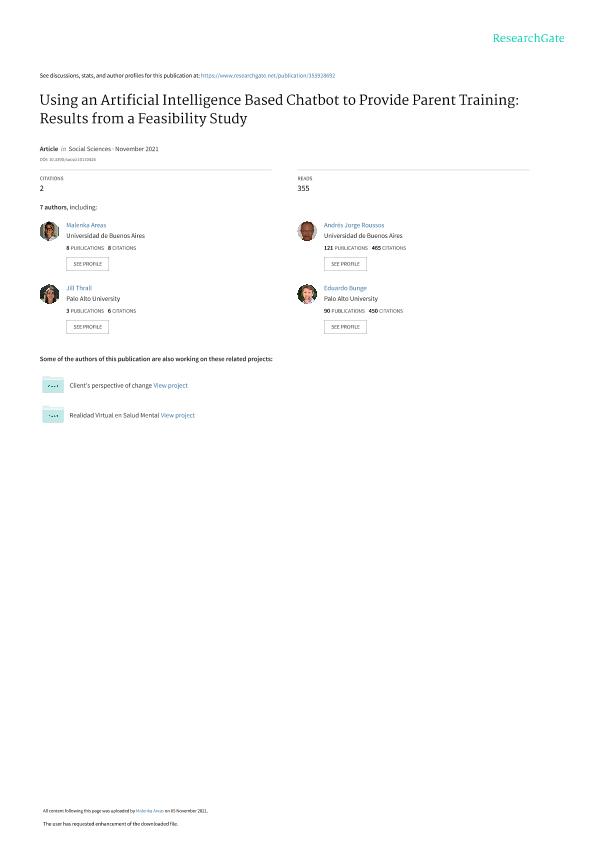Artículo
Using an Artificial Intelligence Based Chatbot to Provide Parent Training: Results from a Feasibility Study
Entenberg, Guido A.; Areas, Malenka Alejandra ; Roussos, Andres Jorge
; Roussos, Andres Jorge ; Maglio, Ana Laura
; Maglio, Ana Laura ; Thrall, Jillian; Escoredo, Milagros; Bunge, Eduardo L.
; Thrall, Jillian; Escoredo, Milagros; Bunge, Eduardo L.
 ; Roussos, Andres Jorge
; Roussos, Andres Jorge ; Maglio, Ana Laura
; Maglio, Ana Laura ; Thrall, Jillian; Escoredo, Milagros; Bunge, Eduardo L.
; Thrall, Jillian; Escoredo, Milagros; Bunge, Eduardo L.
Fecha de publicación:
11/2021
Editorial:
MDPI
Revista:
Social Sciences
e-ISSN:
2076-0760
Idioma:
Inglés
Tipo de recurso:
Artículo publicado
Clasificación temática:
Resumen
Online parenting training programs have shown to be effective. However, no studies on parent training programs delivered through chatbots have been reported yet. Aim. This study aims to assess the feasibility of delivering parenting skills through a chatbot. Methods. A sample of 33 parents completed a pilot feasibility study. Engagement, knowledge, net-promoters score and qualitative responses were analyzed. Results. A total of 78.8% of the sample completed the intervention. On average, participants remembered 3.7 skills out of the 5 presented and reported that they would recommend the chatbot to other parents (net promoter score was 7.44; SD = 2.31 out of 10). Overall, parents sent a mean of 54.24 (SD = 13.5) messages to the chatbot, and the mean number of words per message was 3. Main themes parents discussed with the chatbot included issues regarding their child’s habits, handling disruptive behaviors, interpersonal development, and emotional difficulties. Parents generally commented on the usefulness of the intervention and suggested improvements to the chatbot’s communication style. Conclusions. Overall, users completed the intervention, engaged with the bot, and would recommend the intervention to others. This suggests parenting skills could be delivered via chatbots.
Palabras clave:
ARTIFICIAL INTELLIGENCE
,
CHATBOTS
,
ENGAGEMENT
,
PARENT TRAINING
Archivos asociados
Licencia
Identificadores
Colecciones
Articulos(SEDE CENTRAL)
Articulos de SEDE CENTRAL
Articulos de SEDE CENTRAL
Citación
Entenberg, Guido A.; Areas, Malenka Alejandra; Roussos, Andres Jorge; Maglio, Ana Laura; Thrall, Jillian; et al.; Using an Artificial Intelligence Based Chatbot to Provide Parent Training: Results from a Feasibility Study; MDPI; Social Sciences; 10; 11; 11-2021; 1-9
Compartir
Altmétricas



